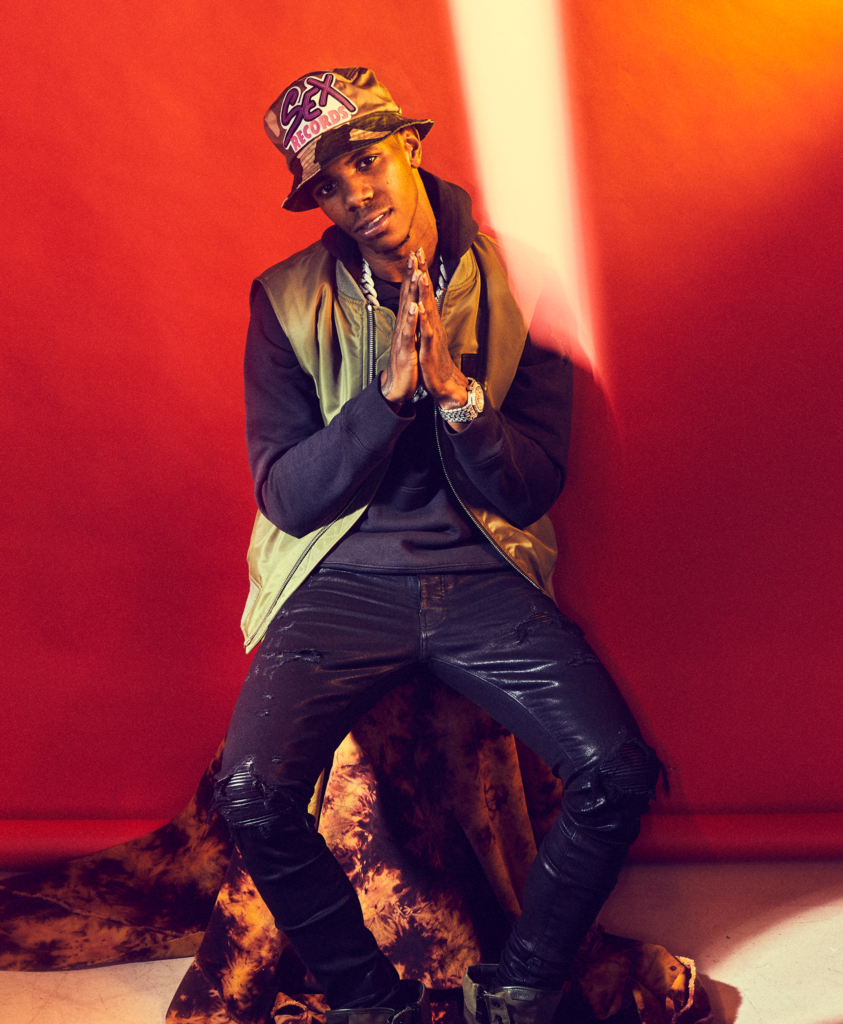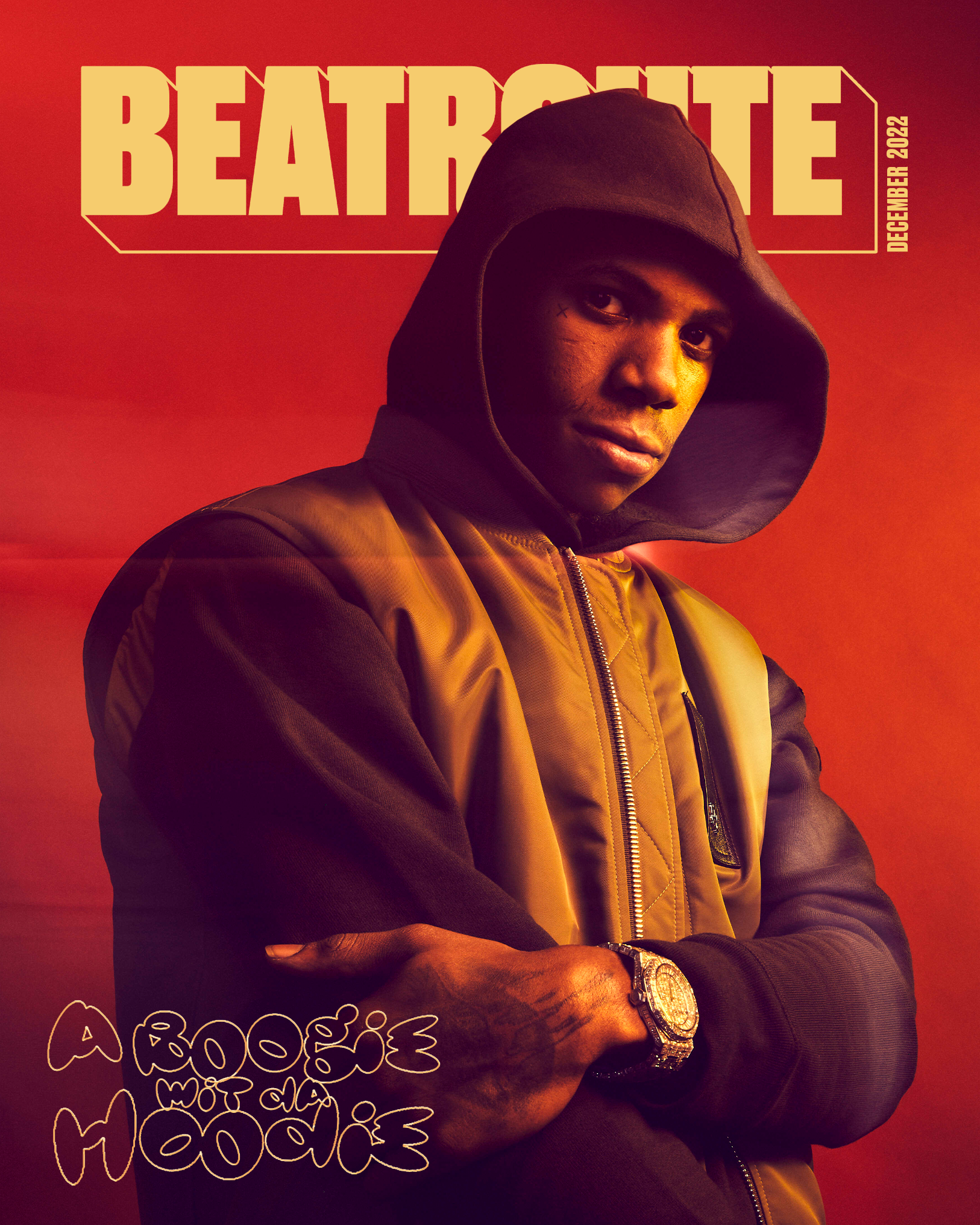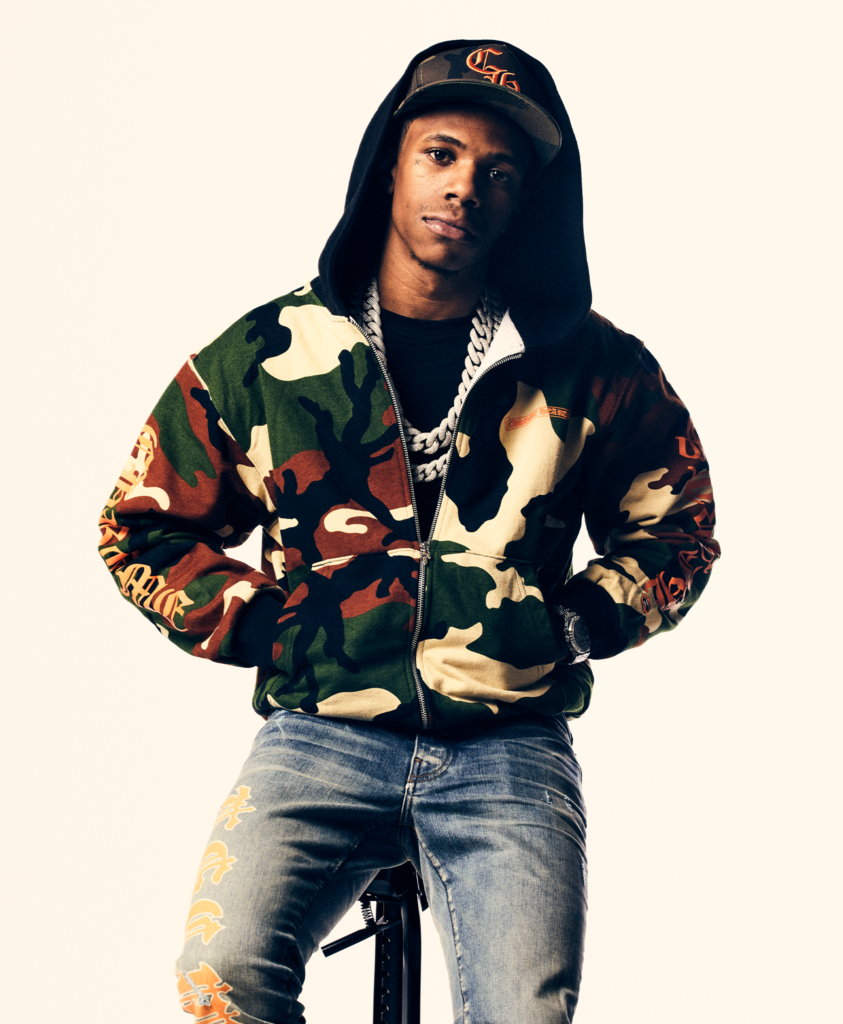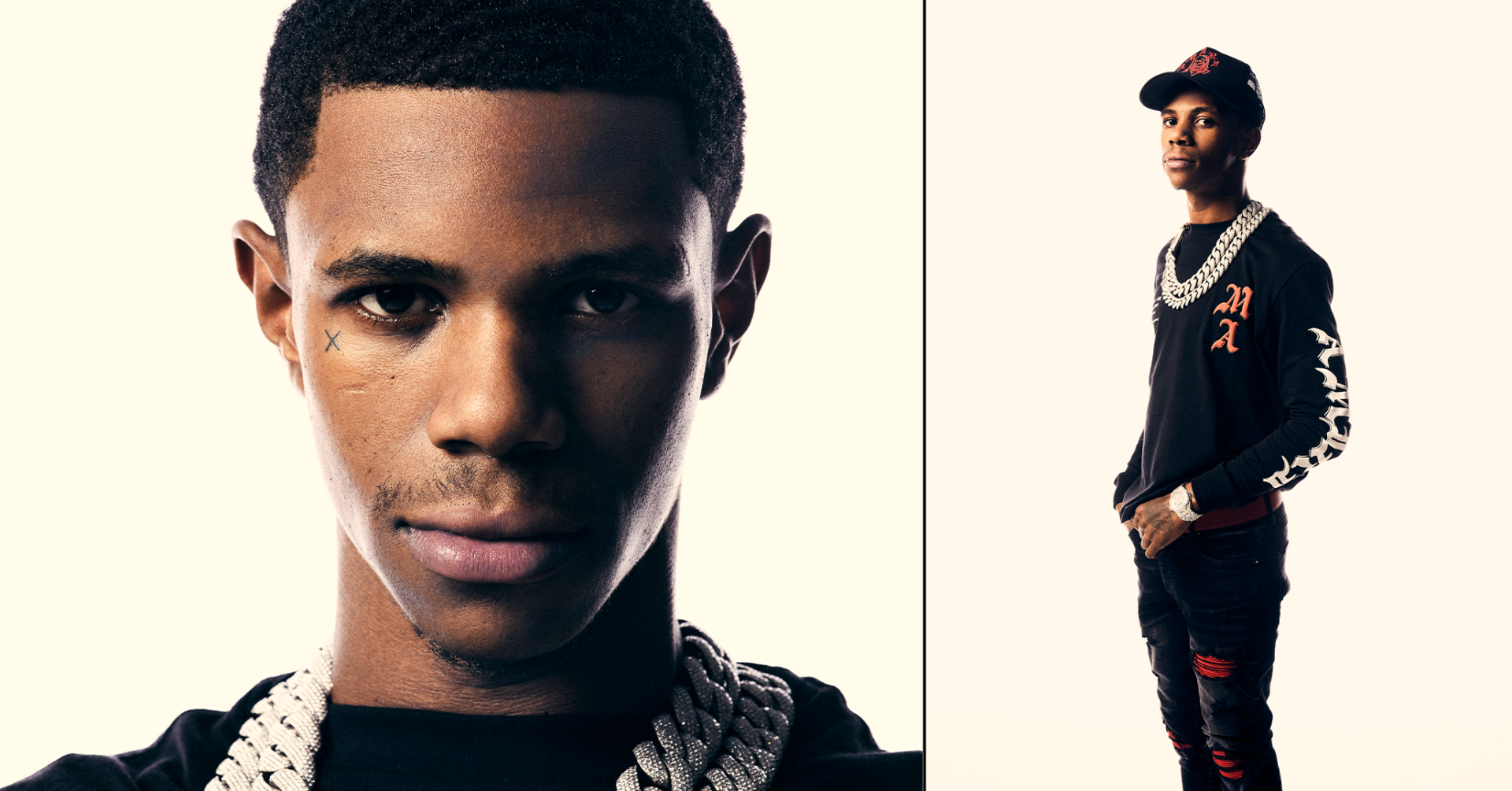COVER
A Boogie Wit Da Hoodie
On D.T.B. (Duality Teaching Balance)
By Gabby Sgherri
Publishing date: Dec 09, 2022
B
Born Artist Julius Dubose it feels kismet that A Boogie Wit Da Hoodie would live up to his name and become a star from the Bronx, New York which, coincidentally, is credited as the birthplace of hip-hop—the exact genre he excels in with knockout hooks and earworm melodies. “You know how you got to listen to your parents when you’re younger and you don’t really listen and go through it yourself?” Boogie asks me as a way to explain his internally focused headspace while making his fourth studio album Me vs. Myself. He answered his own questions and didn’t ask for others’ opinions which put him in the phase of “being hard-headed [and] going through things myself so I could know the second time.” It’s a fitting creative process for an album that showcases two sides of him—Artist and A Boogie. At 22 songs long with features from Roddy Ricch, Lil Durk, G Herbo, Kodak Black, Tory Lanez, Don Q, and H.E.R the album’s highly anticipated release and length will soothe fans who have been begging Boogie for weeks to drop the album in his Instagram comments. Although he relied on internal instincts to make executive decisions, he’s the first to say that inspiration’s gotta come from somewhere external and it’s what you do with it that matters.
“I was talking to Swizz Beatz last night about how inspiration comes along and we don’t even know how it’s brought upon us,” he says, mentioning the esteemed producer that shares Bronx roots with him. “When we in the car going to the studio, we would be in the car for 45 mins listening to a whole lot of songs [and] not thinking [about] what we [gon] say in the studio. By the time we get to that session, that little bit of what we saying is inspiration from what we just heard—plus what we grew up on and everything,” he continues gesturing with his hands to different things in the air around him. “So it’s not just you. You can’t make things and it originally be you, it’s gonna sound different if it’s different but there’s no such thing as being straight-up original and having no inspiration off nothing,” he concludes illustrating that similarities in music are inevitable but the difference between copycats and artists is knowing how to take that seed of inspiration and manipulate it into something that’s your own.
If you pay close attention, you’ll hear how Boogie’s inspirations are manifested throughout the album. The R&B-influenced melodies and wordplay on “Emotions” have direct references to Usher, namely his 2000s hits “U Got It Bad” and “Nice & Slow”. In signature Boogie style, the song’s love theme isn’t in the same pining vein as Usher, he shares his reservations about letting a partner in while affirming he’ll be okay on his own if it doesn’t work out. It’s that in your feelings but not really sentiment that made his “Artist” songs so popular to begin with. Interpolating “U Got It Bad”, Boogie adds his twist to the original lyrics by singing “Wanna see me heartbroken so I can sing love songs like / I’m your man and you’re my girl / Christian Dior your world / You match my whole fly / Show you hoes to the whole wide world” before switching the melody again and adding the recognizable “I’ll fuck you right, I will, I’ll fuck you right, I will” from “Nice & Slow”.
“I always like to show credit to the people that inspired me to be here today, Usher is one of them [and] all the people that my mom and dad threw down in music to me when I was younger,” Boogie says, explaining the root of those lines. “When it comes to being good at something I like to attack it more. So, that’s how I figured out I can grab a sample and body it, really make it sound like mine at the same time as showing love and appreciation to the artist and the people that worked on it first,” he continues giving more insight into his creative process. “I don’t want to oversaturate that [either] it’s just attacking it at the perfect point.”

Born Artist Julius Dubose it feels kismet that A Boogie Wit Da Hoodie would live up to his name and become a star from the Bronx, New York which, coincidentally, is credited as the birthplace of hip-hop—the exact genre he excels in with knockout hooks and earworm melodies. “You know how you got to listen to your parents when you’re younger and you don’t really listen and go through it yourself?” Boogie asks me as a way to explain his internally focused headspace while making his fourth studio album Me vs. Myself. He answered his own questions and didn’t ask for others’ opinions which put him in the phase of “being hard-headed [and] going through things myself so I could know the second time.” It’s a fitting creative process for an album that showcases two sides of him—Artist and A Boogie. At 22 songs long with features from Roddy Ricch, Lil Durk, G Herbo, Kodak Black, Tory Lanez, Don Q, and H.E.R the album’s highly anticipated release and length will soothe fans who have been begging Boogie for weeks to drop the album in his Instagram comments. Although he relied on internal instincts to make executive decisions, he’s the first to say that inspiration’s gotta come from somewhere external and it’s what you do with it that matters.
“I was talking to Swizz Beatz last night about how inspiration comes along and we don’t even know how it’s brought upon us,” he says, mentioning the esteemed producer that shares Bronx roots with him. “When we in the car going to the studio, we would be in the car for 45 mins listening to a whole lot of songs [and] not thinking [about] what we [gon] say in the studio. By the time we get to that session, that little bit of what we saying is inspiration from what we just heard—plus what we grew up on and everything,” he continues gesturing with his hands to different things in the air around him. “So it’s not just you. You can’t make things and it originally be you, it’s gonna sound different if it’s different but there’s no such thing as being straight-up original and having no inspiration off nothing,” he concludes illustrating that similarities in music are inevitable but the difference between copycats and artists is knowing how to take that seed of inspiration and manipulate it into something that’s your own.
If you pay close attention, you’ll hear how Boogie’s inspirations are manifested throughout the album. The R&B-influenced melodies and wordplay on “Emotions” have direct references to Usher, namely his 2000s hits “U Got It Bad” and “Nice & Slow”. In signature Boogie style, the song’s love theme isn’t in the same pining vein as Usher, he shares his reservations about letting a partner in while affirming he’ll be okay on his own if it doesn’t work out. It’s that in your feelings but not really sentiment that made his “Artist” songs so popular to begin with. Interpolating “U Got It Bad”, Boogie adds his twist to the original lyrics by singing “Wanna see me heartbroken so I can sing love songs like / I’m your man and you’re my girl / Christian Dior your world / You match my whole fly / Show you hoes to the whole wide world” before switching the melody again and adding the recognizable “I’ll fuck you right, I will, I’ll fuck you right, I will” from “Nice & Slow”.
“I always like to show credit to the people that inspired me to be here today, Usher is one of them [and] all the people that my mom and dad threw down in music to me when I was younger,” Boogie says, explaining the root of those lines. “When it comes to being good at something I like to attack it more. So, that’s how I figured out I can grab a sample and body it, really make it sound like mine at the same time as showing love and appreciation to the artist and the people that worked on it first,” he continues giving more insight into his creative process. “I don’t want to oversaturate that [either] it’s just attacking it at the perfect point.”


You can’t make things and it originally be you, it’s gonna sound different if it’s different but there’s no such thing as being straight-up original and having no inspiration off nothing.
You can’t make things and it originally be you, it’s gonna sound different if it’s different but there’s no such thing as being straight-up original and having no inspiration off nothing.
“Emotions” is one of multiple songs on Me vs. Myself where Boogie bodies samples, lyrical shout-outs, and melodies in a manner that’s uniquely his own by balancing it with a musicality that would be defined as his signature sound. Finding all the different ways he does this throughout the album is a puzzle—if you figure it out, you’re one step closer to understanding him. On the fast-paced hip-hop track “Water (Drowning Pt. 2)” featuring Kodak Black, he raps “50 Cent taught me how to rob” mentioning 50 Cent’s 1999 song of the same name and a few bars later says “And I’m from New York / You can call me baby, baby like I’m Biggie Smalls” mentioning Biggie’s 1994 hit “Juicy”. The whole verse is about his beginnings, referencing the struggles he’s overcome while also paying homage to two legendary New York rappers. A testament to his artistic nature is that none of this is calculated. “It’s more unintentional when it comes to me just freestyling and finding things while I’m freestyling. When you close your eyes and think of things, whatever you think and say creates inspiration to say other things. You gotta start somewhere. I can’t plan things, put it together and it comes out perfect—I gotta just do that.”
Even the division of “Artist” and “A Boogie” songs on the track list wasn’t premeditated. “That part was hard for me to figure out because I didn’t make the songs having myself think about A Boogie is making a song. I just made the songs and picked at the end like this is A Boogie, this is Artist so it was a real puzzle. I came to [the] conclusion of okay, this is A Boogie—he over here going crazy with bars, screaming and spitting,” he says putting his hand down on one side of the table as a physical representation of the split. “When it comes to Artist, Artist is more for the female fan base that I started with at the beginning and A Boogie is for the streets plus more which creates a global balance, “ he continues as his palms come together to symbolize the unity of his two sides.
Boogie’s mindset discussing other facets of his career, such as legacy and success, is telling of his personal growth which is as paramount to longevity as style. Acknowledging his definition of success is ever-evolving he says, “even your definition of greatness [or] big changes every year especially when you’re climbing. If you’re not climbing—it might not go up.” Prefacing that the pursuit of different energy or environments should stem from genuineness he continues, “go around things that really have you learn, get inspired, and do better things.” In true songwriter form, Boogie often draws metaphors using his own experiences to illustrate the meaning of what he just said. “Before, [when] I was thinking about real estate I wanted to buy houses.” He’s now at the point where he’s thinking about buildings and even looking ahead to properties like resorts—a subtle net worth flex occurring from an upwards trajectory. The takeaway? “You never know where the mindset of little things can actually take you on that hill.”
On the other hand, he’s less concerned with the idea of legacy and each album playing a part in creating his. “I have mood swings when it comes to legacy, sometimes I care [and] sometimes I don’t, to be honest.” Clarifying that the pendulum swings towards irreverence largely because legacy is an arbitrary social construct he says, “people bring up your name because of the respect and what [they’re] taught that’s supposed to be done when somebody is gone but that legacy shit…it don’t matter really”, with a laugh. It does seem backward to spend your time alive concerned about what will be said or done when you’re gone—career-wise. However, he’s also a father to two young kids, Melody Valentine Dubose and Artist Dubose Jr, and that’s something to think about. “At the end of the day, just do what’s best for what you think is best, and what I think is best is making sure I’m good with my family when it comes to my kids being [able to do] whatever they want in life—they can get to choose. It’s little things that I got more meaning in life with now.”

I wanted to separate the song overall, I didn’t even want the album to land on PnB Rock's birthday—I wanted that song to be on his birthday.
Providing choices for his kids goes beyond financial resources and adds meaning to milestone moments outside of music. In February 2022, the Disney revival of the classic 2000s show, The Proud Family, premiered and Boogie voiced the character of Francis ‘KG’ Leibowitz-Jenkins. “Being on a cartoon—Disney Channel in specific—is crazy when it comes to having children and them being able to grow up watching their dad on a cartoon, it’s different.” He cracks a grin musing that he can only imagine the feeling of sitting on the couch with his dad as a kid and simultaneously hearing his voice on TV. “You wanna give people more to look at, I don’t want my kids to only look at being a rapper as an option in life. I did a lot to become a rapper, not on purpose, it just so happened like that. I didn’t wanna go through all that dumb shit I went through as a kid but everything landed in a specific position,” he explains using his forearm to demonstrate the upwards path of his life and the position at the top with his hand. “I don’t wanna have that [be] repetitive with my kids and stuff.”
Hand gestures and metaphors aside, another characteristic trait of Boogie’s I noticed is to speak in riddles. He’ll say these phrases that seem confusing at first but when you take a moment to unpack—it makes sense. You may remember the meme-able “sometimes you just gotta think about things like how you don’t want to think about things,” from his BigBoyTV interview in 2020. Boogie throws one my way on the topic of industry benchmarks—streaming numbers, Billboard charts, platinum certifications—first stating the pursuit and achievement of such things is fun for him rather than looming objects on the horizon. “I love puzzles so it can’t really frustrate me that much—I love frustration. You gotta love your job, it’s easy when you love your job but when you make it a job—it gets a little frustrating,” he says ingeniously.
My interpretation of this Boogielation is if you enjoy what you do, accolades and recognition will follow. And sometimes they won’t but you’ll only be frustrated if you make it your job to “make a #1 album” rather than just making music because that’s what you love to do. To take it a step further, if you reframe other people’s reception of your work as a puzzle, you can find joy in trying to figure out how to get the desired reaction through trial and error. Either way, you have to enjoy the process of what you’re doing because trying to derive joy from anything outside of your control will always be volatile. “I like the music I make when I’m in my bag like when I’m mad, frustrated, angry, [or] sad—I like making that type of music,” Boogie says, further proving the importance of emotive creation over a checklist-driven occupation.
One piece of the puzzle when constructing any album is the featured artists, “it’s a mixture of me giving the fans what they want to hear at the same time as me knowing what sounds good,” says Boogie about the criteria that informed his selection process. “You can’t keep on playing the same vibe back to back so you look [to other] artists and at the same time, I look for other artists in myself—in my vocals—to help [create] a whole mix [that] sounds like a DJ mix like you in the car listening to the radio instead of listening to an album.” Boogie’s mindfulness of balance seems to be an intrinsic part of his creative process and one he knows exactly how to leverage. The balancing act may not always be limited to a few songs on an album though, “There [are] so many artists that I wanna collaborate with on a project, I’m only [27] years old [and] I feel like I have more to work on for myself for at least one or two more projects but I wanna go on a steak when it comes to that too.”

Boogie mentions Lil Durk (who’s featured on “Damn Homie” and “24 Hours”) as a potential co-collaborator before saying, “I wanna collaborate with [Young] Thug still. Hopefully, he comes home soon. When it comes to all the damn songs we got in the cut I don’t even want to let it go while he’s locked up.” The ongoing incarceration of Young Thug (along with Gunna and other YSL members) casts a shadow over the excitement of a potential Boogie and Thug album. As Boogie raps on “Water (Drowning Pt. 2)”, “We was really pushin’ Ps and crackin’ cars, but I couldn’t say that in songs / They gon’ try to make a case out of what I say no matter if it was true or false”, the indictment against Thug has called into question the ethics of using rap lyrics as evidence in court.
The somberness of this year’s reality continues on the topic of the late PnB Rock. The prominent rapper tragically passed away in September and was a close friend of Boogies. In an Instagram post paying tribute to PnB, Boogie wrote “It’s not too many mfs that rap I call my brother fr but Rock was one of them” and comment after comment echoes the sentiment that the two made a great duo in the studio as well. In what could be their final collaboration, although posthumous music has become commonplace, Boogie has one more song to share. “I wanted to separate the song overall, I didn’t even want the album to land on his birthday—I wanted that song to be on his birthday,” Boogie says, acknowledging the December 9th release date coincides with PnB’s birthday. “I wanted it to be more about him. When it comes to that song—that gotta be one of my favorites on that. ” While it’s not part of the album’s official release, the careful consideration to separate it speaks to the duo’s personal relationship and the type of person Boogie is with loved ones. Releasing on December 12th instead, the collaborative track falls under “Artist” vibes with slick sing rap melodies and heartbroken but still savage lyrics, commemorating the hip-hop/R&B lane they both pioneered in 2016.
For someone in the public eye, Boogie is a bit of an enigma, his name comes up in conversation because of new releases but he doesn’t play into relevancy by means of internet beef, serving his personal life up on a platter, or generally “doing the most” to stay in the news cycle. Since his Artist 2.0 album in 2020, he’s kept his head down. “I took about two years off just now not dropping any albums and stuff. It was beneficial to me, personally, but it was more selfish to the people outside looking in,” Boogie divulges. In the highly saturated genre of hip-hop, critics and fans alike dismiss music for being repetitive and formulaic almost as quickly as they reject an artist for experimentation that diverts from their “old” sound. To a discerning ear, there will always be subtleties that separate an authentic artist from a copycat or a viral artist from a veteran.
Lyrically, you know Boogie’s music will evoke toxically in-love or audaciously in-your-bag feelings which may not be a rarity but that’s where the sound comes in. Album after album, Boogie has a dynamic way of wielding melodies, voice inflections, samples that unite the past and present, and beat switches—sometimes reshaping his sound multiple times in the same song. “Nobody knows exactly what I’ve been through. I can’t really answer that to people in a way that makes them feel better but the most I can do is be consistent with my music and have people not ask no questions.” If Me vs. Myself proves anything, Boogie’s duality is a result of his individuality, affirming that no matter how many rappers try to bite his style, he’ll always be one of one.
Photographer: Jimmy Fontaine
